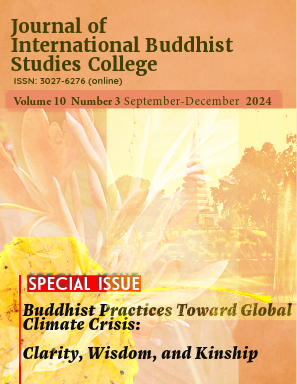Buddhism-Based Resolution to the Problems Leading to Conflict in Thai Society
Main Article Content
Abstract
This research explores the application of Buddhist principles in resolving conflicts within Thai society, focusing on the underlying causes and proposing comprehensive solutions. The study has three primary objectives: (1) to investigate the problems and root causes of conflicts in Thailand, (2) to analyze Buddhist teachings related to conflict resolution, and (3) to recommend Buddhist practices for effective conflict management. Employing a qualitative research approach, the study utilizes document analysis, case studies from the Tripiṭaka, and in-depth interviews to examine the factors contributing to social discord.
The results indicate that conflicts in Thai society primarily arise from political governance, economic difficulties, and social challenges. According to Buddhist teachings, these conflicts are rooted in the three defilements: craving (taṇhā), misguided beliefs (diṭṭhi), and pride (māna). To mitigate these issues, the study introduces four essential Buddhist principles: (1) the Six Sārāṇīyadhamma to promote harmony, especially in political contexts; (2) the Four Diṭṭhadhammikattha to encourage economic stability through self-sufficiency; and (3) the Seven Sappurisadhamma to foster ethical behavior and social unity, which aids in social conflict resolution.
Moreover, the research emphasizes the critical role of the Four Noble Truths in conflict resolution, offering a systematic approach to identifying root issues (dukkha), understanding their causes (samudaya), and proposing viable solutions (magga) to achieve resolution (nirodha). By blending these Buddhist principles with contemporary conflict management strategies, this study illustrates the enduring relevance of Buddhist teachings in addressing the complexities of modern Thai society. Ultimately, it highlights the potential of Buddhist principles to cultivate non-violence, mutual respect, and enduring peace, enriching the dialogue on conflict resolution in Thailand and providing a valuable framework for resolving disputes in various cultural contexts globally.
Article Details
The Journal of TCI is licensed under a Creative Commons Attribution-NonCommercial-NoDerivatives 4.0 International (CC BY-NC-ND 4.0) licence unless otherwise stated. Please read our Policies page for more information on Open Access, copyright and permissions.
References
Bhikkhu Bodhi. (2000). The Connected Discourses of the Buddha: A New Translation of the Saṃyutta Nikāya. Vols.1-2. Wisdom Publications.
Bhikkhu Bodhi. (2005). In the Buddha’s words: An anthology of discourses from the Pāli Canon. Wisdom Publications.
Buddhadasa Bhikkhu. (1996). Handbook for mankind. Dhamma Study and Practice Group.
Burch, R. (2020). Mindfulness and emotional regulation: Enhancing conflict resolution. Journal of Mindfulness Studies, 12(3), 45-60.
Dhammananda, K. (2020). Buddhist leadership for sustainable development. Buddhist Publication Society.
Galtung, J. (1996). Peace by peaceful means: Peace and conflict, development and civilisation. Sage Publications.
Goleman, D. (2011). The brain and emotional intelligence: New insights. More Than Sound.
Hanh, T. (2017). The art of communicating. HarperOne.
Kabat-Zinn, J. (2003). Mindfulness-based interventions in context: Past, present, and future. Clinical Psychology: Science and Practice, 10(2), 144-156.
King, S. B. (2009). Socially engaged Buddhism. University of Hawaii Press.
Mazza, D. (2021). How did the Buddha deal with conflicts during his life? A Theravāda perspective. Journal of Buddhist Ethics, 28, 159-176.
Moore, C. W. (2014). The mediation process: Practical strategies for resolving conflict. John Wiley & Sons.
Ñānamoli Bhikkhu. (2006). The path of purification (Visuddhimagga). Buddhist Publication Society.
Nyanaponika Thera. (1978). The roots of good and evil. Buddhist Publication Society.
Phra Dhammapidok (P.A. Payutto). (2002). The Constitution of Life. King Prajadhipok’s Institute and Bangkok.
Phra Dhammapidok (P.A. Payutto). (2003). Breaking up conflict. Sahathamika.
Phra Phromkhunaporn (P.A. Payutto). (2010). The Constitution of Life. (122nd printing). Printing House Sahathamika Company.
Phra Pisan Visalo. (2006). Conflict resolution through Buddhist principles. Thai Journal of Peace Studies, 2(1), 25-36.
Phuakkhong, C., Phanthawong, P., & Khutkhong, B. (2019). Conflict management: the science and art of peace in Buddhism. Sumedha Journal of Management, 8(3), 14-22.
Rahula, W. (2006). What the Buddha Taught. Grove Press.
Satsinthon, S. & Namanee, P. (2022). A Critical Study on Karl Marx’s Conflict Management Theory and The Conflict Management by Buddhist Peace Model. Journal of Prajna Ashram, 1(1). 1-9.
Shakya, T., & Wangchuk, T. (2020). Compassion and interdependence in Buddhist conflict resolution. Journal of Buddhist Ethics, 27, 101-120.
Sirisakulkhemathat, S. (2016). Buddhist Philosophy: Solving Political Conflicts. [Doctor of Laws (Politics), Ramkhamhaeng University].
Sukomal, R. (2021). Theravada Buddhism and modern conflict resolution. Journal of Peace Studies, 18(3), 45-67.
Thongbun, A. (2015, December 13). How to solve conflict problems in Thai society through Buddhist reconciliation. https://www.mcu.ac.th/article/detail/14305.
Walshe, M. (1987). The long discourses of the Buddha: A new translation of the Dīgha Nikāya. Wisdom Publications.


